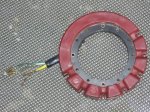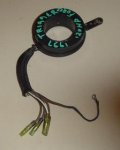Wonbigfish
Seaman Apprentice
- Joined
- Apr 29, 2013
- Messages
- 36
I have a 1997 90hp Force Outboard on a 16.5ft Palm Beach. Went out fishing Saturday on Mosquito Lagoon. Boat was kinda tough to keep running. Managed to get on a plane & make it back to boat ramp. I noticed on my depth finder voltage was over 18 volts. My question is would a bad voltage regulator cause motor to run rough? Could a bad voltage regulator cause damage to stators. Will changing a bad regulator effect how the motor runs?
Please Advise
Wonbigfish
Please Advise
Wonbigfish





















